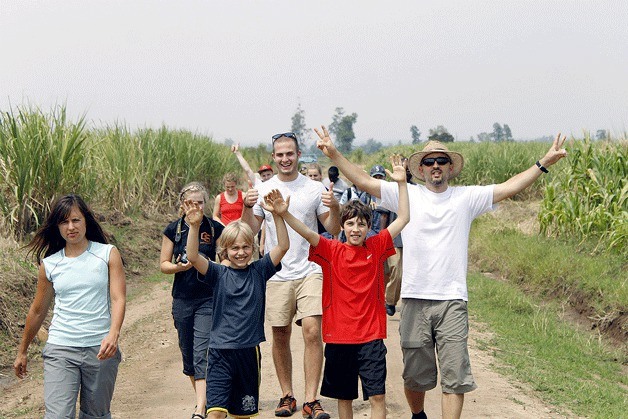Bainbridge High School teacher Brad Lewis is no stranger to traveling, whether it is on an extended trip to teach or a short visit.
The boys basketball coach and statistics teacher won a grant last month that will send him on yet another adventure. This time it will be in the African bush alongside Earthwatch statisticians and scientists who are collecting data to study the effects of human life on the leopard population of the region.
“It’s nice, for every five to seven years, to have something like this,” Lewis said. “Just to keep you fresh.”
Hilton HHonors hosted the Teacher Treks Travel Grant Competition that is giving 15 K-12 teachers in the U.S. a chance to travel this summer to a destination of their choice where they can experience first-hand the subject they teach. The competition’s vision is that by giving teachers the opportunity of subject immersion, they can bring the experience back to the classroom, enriching the curriculum and inspiring students to also explore the world.
After a competitive selection process that included thousands of submissions, a panel of education experts selected Lewis in April as one of 30 finalists. From those 30, public voting finished the selection process of 15 teachers.
Students and colleagues spread the word to vote for Lewis.
There were occasions where students had their phones out during class, but when Lewis asked them to put it away, the prevailing response was that they were voting for him. Family members of his students recognized him at Town & Country and assured him that they were voting for him also.
“I don’t think I would have won the grant without them,” Lewis said of his students and the Bainbridge community.
“The district is so supportive, BHS is full of amazing teachers. I’m just a snippet of it all,” he said.
Winners of the competition are receiving a grant valued at $6,000 to travel. In addition, each winning teacher’s school will receive a $2,500 grant for cultural activities or enhancements.
A former Fulbright recipient, Lewis received an email to Fulbright alumni that shared the Teacher Treks opportunity. He jumped on it.
Lewis has been teaching mathematics at BHS for 10 years, nine of which have been spent teaching AP Statistics, a program he introduced at the school.
It has been his dream since he started teaching statistics to combine real life field work with what he teaches in the classroom.
Lewis will leave for South Africa July 7 and work with the expedition through to July 27. He will spend his first week connecting with schools in the area and forming relationships. The last two weeks he will spend in the bush.
In the Soutpansberg Mountains, the highest known density of leopards exists. Lewis will join scientists in the Earthwatch Expedition in collecting data to see how human life has been affecting their habitat, in what is known as habitat fragmentation.
Fragmentation leads to, among other things, dissimilarities in an animal species. A parcel of land may become divided as human population growth and development spreads. Roads and villages where there were none, now present a danger to a species who depend on crossing between both sides to maintain species continuity. It’s like living in a box, with no room to grow. Meanwhile, other non-leopard species thrive with no predator to hunt them. It causes an alteration in the cycle of life that could effect a whole chain of living organisms.
What goes forgotten in cases like this one, is that statistics play a role in identifying not only causes to a growing problem, but solutions.
Lewis explains in his proposal to Hilton HHonors that Earthwatch Expedition collects data using GPS devices, camera trappings, scat analysis, mammal observations and other field-related techniques to document the increased habitat fragmentation caused by human activities.
“My hope is that I can take that personal experience back into the classroom to show my students exactly how this subject — statistics — comes to life in the world around them,” he wrote.
Traveling with Lewis is Jason Uitvlugt, BHS’ AP Environmental Science teacher. Since the two share many of the same students, they have spent the last few years collaborating in their lesson plans and brainstorming ways to encourage their students to go deeper in environmental science and statistics.
After Lewis pinned down the grant with Hilton HHonors, Uitvlugt and Lewis worked together to find enough money through STEM (Science, Technology, Engineering, and Mathematics) to provide Uitvlugt with a grant substantial enough to join Lewis for the last two weeks of the trip.
It is their idea to join the science component with the math in a combined experience they can bring back to BHS and STEM studies in the fall.
Lewis will focus on his experience next year when he teaches observational study methods, correlation inference models and standard sampling techniques.
And Uitvlugt plans to share his experience when he teaches units on habitat conflict, endangered species and climate change.
“Here, Bainbridge kids are interested, they ask questions,” Lewis said. “You have to know your subject, because students will challenge you if you’re not ready.”
He finds that inquisitive energy offers big possibilities for his and Uitvlugt’s courses, and he hopes that in the future a student traveling opportunity can grow from his experience.
The chance to travel to southern Africa is something Lewis keeps an eye out for. The Earthwatch Expedition represents not only a professional goal for Lewis, but also a personal one.
Twenty years ago, Lewis traveled to Africa as a Peace Corps volunteer. He spent two years living in a rural village within a Basotho community where he taught mathematics.
Sharing a facet of that experience is something he hopes to share with his students. And it’s a region he often tries to return to, though budget constraints don’t always offer that possibility.
This year that won’t be so.



